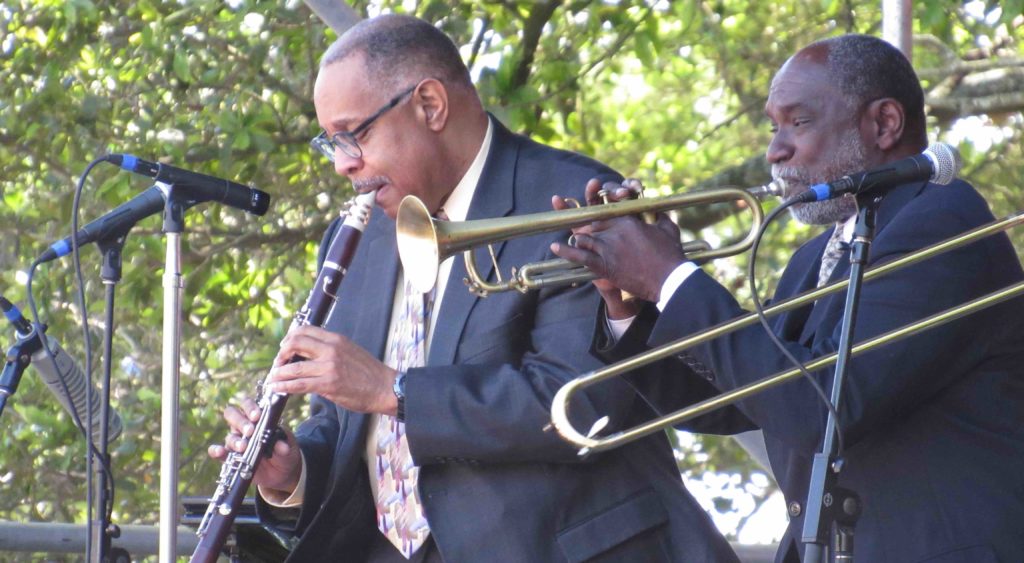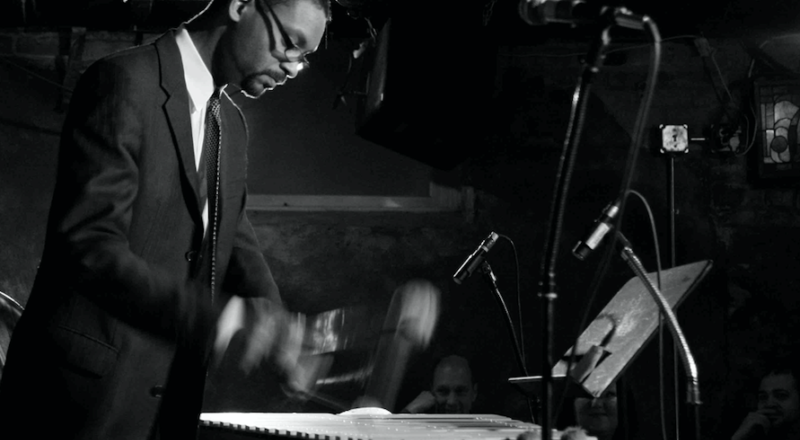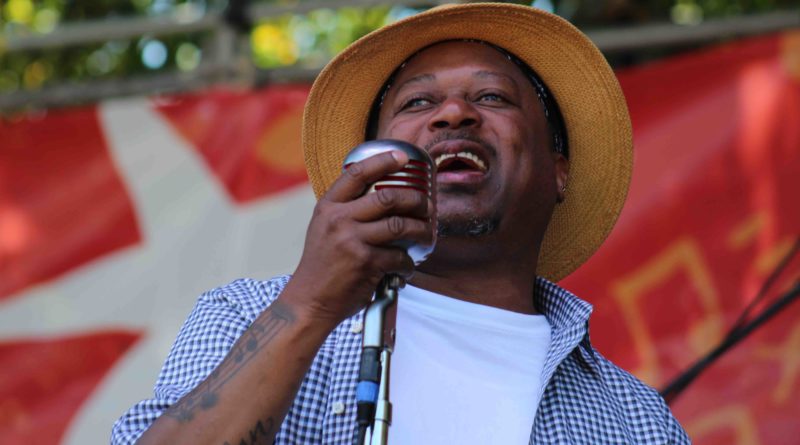INTERVIEW: Basin Street Records knows how to weather a storm or two
Photo: Kermit Ruffins is a recording artist with Basin Street Records. Photo by John Soltes.
Basin Street Records, the important and influential record label out of New Orleans, has survived and thrived for more than two decades. It has learned to bounce back, no matter the odds. Whether Hurricane Katrina or the current coronavirus pandemic, catastrophes have been present throughout the company’s storied history, but so have the triumphs and celebrations.
Mark Samuels, the president of Basin Street, has been promoting the careers of NOLA acts ever since 1997, when he was pushing a live recording of Kermit Ruffins live at Tipitina’s. Now, almost a quarter of a century later, Ruffins stands as the label’s best-selling artist and one of New Orleans’ musical ambassadors.
But this time feels different for Samuels and his company. COVID-19 has ravaged New Orleans and the state of Louisiana, and the news continues to be bleak. Tourists, music lovers and festival-goers have largely stayed away from the southern city, and the many working musicians on the Basin Street label have been sidelined from live gigs with a paying audience.
There’s also the sad and reflective news of the death of Ellis Marsalis, a titan of NOLA music and one of the most influential educators and pianists in the city’s long, long history. Ellis wasn’t technically a recording artist for Basin Street, but his son, Jason Marsalis, continues to release music on the label. Also, a few years back, there was a duo album of love songs, ballads and standards by Ellis and Irvin Mayfield.
“Mr. Marsalis meant everything to me,” Samuels said in a recent phone interview. “He’s the reason we have a record label. My friendship with Delfeayo and Wynton back in high school, the network of people that I met as a result of that friendship through the years, led to my interest in doing something other than consulting and energy and finding something that I loved, so I give him and his family all the credit for that. Losing Mr. Marsalis during this time and not being able to really properly mourn and properly bury him, all those things, it’s terrible.”
Samuels is considerate of the history-making destruction that COVID-19 is making and how it is transforming his beloved city. Ultimately, the Big Easy celebrates life, and the city likes to have fun. Now that fun has been stopped and deemed too dangerous, and there’s not much relief in sight.
“This time of year in particular we have festival after festival after festival,” Samuels said about April and May, which saw the cancellations of the New Orleans Jazz & Heritage Festival and French Quarter Fest. “Our clubs are busy because of the festivals and the tourism, and the conventions are in town at this period of time. We have this immediate problem with that. … Our artists, musicians, the gig economy, the travel and tourism economy is much more affected I think in a city like New Orleans, and there really aren’t a lot of cities like this.”
MORE: Click here for Hollywood Soapbox’s interview with Jason Marsalis.
At the time of this interview, Samuels was hopeful that New Orleans was a couple weeks away from opening back up, but the latest resurgence across much of the southern United States has stalled progress. It’s looking unlikely that normal — whatever that is — will come anytime soon.
“We all have this experience in New Orleans,” he said. “Everybody’s got their own personal tragedies in their lives, personal experiences that make them stronger and more able to cope with what are the hurdles that are placed in our path, but collectively in New Orleans we have the hurdle of the levees breaking 15 years ago. And we know that times can be very tough and that we can overcome those problems. I’m sure that we will, but I do think because we are a tourism economy, it’s so important. Our travel and tourism and convention business is going to hurt for a while, and we’re going to have a longer time recovering than say a city that’s economy is based on technology or manufacturing or something else. We’re very dependent on tourism, and we’re very dependent on energy. And both of them happen to be hurting greatly at the moment with oil prices as far down as they are.”


That’s the business side, and then there’s the artistic side of New Orleans. Things have changed no doubt with many live venues shutting down, but amazingly and resiliently many of NOLA’s acts, including several Basin Street artists, have continued on with virtual programming, inviting listeners to check out the creation process and enjoy a living-room concert.
“Now as far as what our artists do, we have to keep doing what we do,” Samuels said. “I’m on the backs of our artists. I ride their coattails and try to promote what it is that they do. We all live to work. Work is what allows us to live, and our artists provide one of those things that provide beauty in our lives and love in our lives. And if the only way we can gather is by watching Kermit performing at the Mother-in-Law Lounge or watching Jon Cleary do a quarantine happy hour on his Facebook page, then that’s what we’re going to do for now. It’s important that they keep doing that.”
An example of this resiliency and this need to continue could be found in how Snug Harbor paid tribute to Ellis Marsalis. The Frenchmen Street club, which has been shuttered these past few months, welcomed Ellis for a regular Friday-night residency for years and years. So they decided to keep that residency going, at least for one more Friday.
“It’s important that Snug Harbor give people an opportunity to gather online and celebrate what would be the set time that Ellis Marsalis would typically play at Snug Harbor, and David Torkanowsky performed at his home on the Snug Harbor Facebook page,” Samuels said. “It gave people an opportunity to gather and remember Mr. Marsalis, so that’s what we’re going to have to do.”
Basin Street is soldiering on with recently released music from Dr. Michael White and Jason Marsalis. Both artists released live albums a few weeks ago; the sets were recorded the night that Basin Street rented out the Little Gem Saloon in NOLA for its 20th anniversary bash. The many gigs that night were captured for posterity, and now fans can relive the jazzy magic.
“We’ve always released quite a bit of music every year in the March and April time frame in time for French Quarter Fest, Jazz Fest and the huge influx of people and the huge number of performances that our artists do in that time period,” he said. “Last year, from April 1 to May 4, our artists had 90 different events on our events calendar on our website when I counted it up — everything from performances at the Jazz Fest, performances at the French Quarter Fest, performances at the Freret Street Festival, performances at Wednesday in the Square, performances at clubs, from Snug Harbor to Mid-City Lanes to Blue Nile to Maple Leaf. … Now we’re faced with the very busiest time of the year for all of New Orleans musicians. … They’re missing out on the very most lucrative time of the year.”
He added: “Last year we were planning on putting out these two live albums, one by Dr. Michael White and one by Jason Marsalis, and I believe people are consuming television these days more than ever. They’re consuming more music in some form or fashion. They’re at home more. They’re on their phones more. I don’t want to say that anybody has too much free time. They might not have as many hours at their job, but if they’re like my wife and I who both run small businesses, if they have a child, they’re also now doing home-schooling. And they are trying to survive, but I felt like it was important to release these two albums.”
MORE: Read Hollywood Soapbox’s interview with Dr. Michael White.
Basin Street started with digital releases because many of their retail partners were closed, and, truth be told, the label receives money quicker when it sells the albums themselves. Samuels was upfront that there has been a money crunch, and having $10 come in within three days, rather than 60-90 days, was a small luxury.
“Right now it’s essential that for us to continue to do what we do that we bring in as much revenue as we can for our music and get paid as quickly as possible,” Samuels said earlier this year. “We love our retail partners, but our retail partners are not going to put money in our pockets for 60 to 90 days after we fill their physical product requests. And I simply don’t have the cash flow to manufacture a couple thousand CDs, so our plan is to release these digitally this week and probably once a little cash flow starts to come in this week we will create a physical product.”
The live albums are now available in CD form as well as digital download. Either format will deliver the goods, and what goods they are. On May 5, 2017, during that year’s Jazz Fest, Basin Street headed to the Little Gem Saloon in the CBD, a neighborhood bordering the French Quarter. This was the night they kicked off a 20th anniversary celebration, a party that lasted for almost a year and a half.
“We kicked off our 20th anniversary celebration with a five-set live concert upstairs and downstairs at the Little Gem Saloon,” Samuels said. “I guess about a year and a half ago we released an album called Live at the Little Gem Saloon: Basin Street Records Celebrates 20 Years, and it contained about two songs from each of the five sets. We had sets from Kermit Ruffins first with Irvin Mayfield, Dr. Michael White, Jason Marsalis, a Davell Crawford set and a set that wasn’t supposed to be but ended up becoming a reunion of Los Hombres Calientes because Henry Butler was not able to make it. His flight was late, and he was not able to make it there on time, which I’m sorry happened because it would have been our last opportunity to have Henry recorded before he passed away two years ago. But we ended up with a reunion of Los Hombres Calientes, which was a band by Irvin Mayfield, Bill Summers and Jason Marsalis initially. That night was five full sets from the artists, and we decided that the sets from Dr. Michael White and Jason Marsalis were the first two that we were going to release as full live shows. So we have about 40 minutes of music from each of those, basically their entire set from that night.”
These releases also serve as a tribute to the Little Gem Saloon, an historic venue that unfortunately closed its doors last year. “It was a beautiful historic jazz club that was home to so much of what happened back in the 1920s,” Samuels said. “But it had been dark for 50 years. We chose that place as the spot [because that’s] where Kermit Ruffins performed most Saturday nights for a number of years.”
The irony should be not lost on the listener. These two albums — Jason Marsalis Live and Dr. Michael White Live — are celebrations of Basin Street Records’ two decades of musical dominance, all set in a historic club that no longer operates, with the music now preserved and released during a pandemic when the live gigging of these artists has stopped. If one listens closely, there’s the faint, but imperceptible, acknowledgement of obstacles overcome, parties to be had, present difficulties to endure and the up-down-up-again future that New Orleans is surely to face — and perhaps the only city in the world uniquely able to tackle with poise, presence and possibility.
By John Soltes / Publisher / John@HollywoodSoapbox.com
Click here for more information on Basin Street Records.

